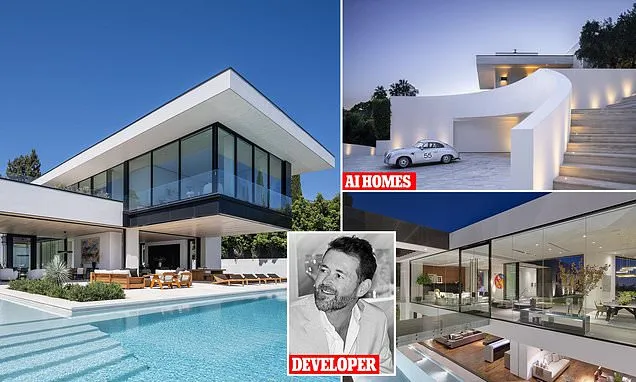Tech bros who made millions, or even billions, over the past decade have a new status symbol obsession - homes run with artificial intelligence that can read their minds.
Forget about just automating lights or programming a thermostat to your liking.
These modern homes, which sell for about $30 million to over $100 million, are intelligent ecosystems that learn, adapt, and respond to the needs of their residents.
Everything from lighting to laundry is done for you, and the home quickly learns your likes and dislikes and performs tasks just the way you like them.
These trophy homes are bought to display wealth but are also meant to stand the test of time, much like the Gilded Age mansions of the late 19th and early 20th centuries that still stand today.
During those years, the wealthy pushed their interiors to the limits with 15-foot ceilings, imported marble, rare curved mahogany wood, gold leafing and intricate mosaics.
Now, buyers have modernized their demands. They want exteriors made of sharp angles and floor-to-ceiling glass with an interior that knows exactly what the owner wants.
They want top-of-the-line security with panic rooms built in, indoor-outdoor living, and state-of-the-art wellness areas, complete with 12,000-square-foot gyms.
The Halycon Residence in Los Angeles, California, built by residential design firm McClean Design, is a futuristic build featuring AI that learn, adapt, and respond to the needs of residents.
These modern homes that start at around $30 million are intelligent ecosystems.
Most importantly, they want the home to personalize to their needs using AI.
'Our style attracts the type of young entrepreneur, or "tech bro" that is interested in refined modern architecture, but with all the bells and whistles,' luxury home developer Paul McClean told the Daily Mail.
His company, McClean Design, also installs and constantly updates fully integrated artificial intelligence systems in the homes that control temperatures, electricity, lighting and security systems.
'We're constantly working with these companies to make sure that the fully integrated smart home systems are state-of-the-art and upgradable since we know that we're only a few years away from being outdated,' McClean said.
The AI analyzes data and then creates real-time conditions, like the kind of lighting and temperature the homeowner prefers. It also predicts upcoming weather patterns and warns the owner of any emergency.
AI quickly picks up the owner's daily routines and prepares the home for different times of the day, dimming lights or boosting brightness for productivity.
AI controls the kitchen, suggesting food and recipes based on dietary habits, tracks expiration dates, can automate cooking times on the stove and can learn to customize your coffee.
Intelligent refrigerators monitor what's inside, recommend grocery lists, and can even order what you need.
Luxury home developer Paul McClean is building these homes for billionaires.
These trophy homes are bought to display wealth but are also meant to stand the test of time much like the Gilded Age mansions of the late 19th and early 20th centuries that still stand today (Pictured: Shadow Lawn at Monmouth University in New Jersey).
AI quickly picks up the owner's daily routines and prepares the home for different times of the day, dimming lights or boosting brightness for productivity.
Tech titans are splashing out on AI-powered homes that don't just respond to commands - they anticipate your every whim.
Paul McClean also specializes in incorporating water elements into the homes, which are on the list of tech bro demands.
AI homes now adjust your mood lighting, filter your windows for how much light you want in, and have soundsystems in every room.
AI even controls the kitchen, suggesting food and recipes based on dietary habits, tracks expiration dates and can learn to customize your coffee.
AI-driven washing machines adjust washing cycles themselves. They can scan fabric types and colors and determine what kind of wash it needs.
Owners can also control security and entertainment using simple voice commands. AI learns from repeated interactions and quickly turns proactive with recommendations for meals, shows, movies and music.
For older people, a home can be outfitted to detect falls, call for help, and remind residents to take their medication.
It even adjusts volume and brightness in rooms as you walk through the house. The home can draw you a bath and can remind you to drink water.
AI also controls solar power, cutting reliance on traditional power grids and self- powering a home in case of emergency.
Smart windows respond to sunlight levels, and tint or clear up automatically.
The home also constantly scans its own appliances, HVAC systems and security devices, and can predict any breakdowns before they happen and schedule maintenance and repairs as needed.
Automated cleaning systems use robots to read floor layouts and adjust cleaning schedules based on an owner's own schedule.
Think floor-to-ceiling glass, razor-sharp angles, and a house that texts you reminders to hydrate throughout the day.
The properties are not just beautiful and secure; they also think and predict—including in the gym—which the home can remind you to visit.
The future of opulence is clean lines and zero effort required from owners to keep on top of tasks and chores.
Silicon Valley's richest are trading startups for smart homes that literally run themselves so owners can focus on other things besides day-to-day home upkeep.
Exotic trees are often shipped in from around the world, and robots keep up with landscaping and watering.
These homes are built with machine-learning systems that evolve with every interaction, becoming more personalized by the day.
'We often do water walls,see-thru pools,koi ponds.As one client has said:"you don't design homes,you design pools with homes attached,"'McClean said。
